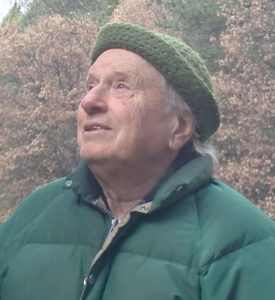
June 12, 1940 – April 18, 2022
Robert Tucker, a Computing Support Analyst in the Department of Computer Science at Stanford University, a Stanford alumnus, and a fixture at the university for more than 50 years, died Monday, April 18, 2022, due to complications following a recent surgery. He was 81.
He was a beloved figure in the department and never retired from Stanford. He was working right up to the time of his surgery. “Bob, we will miss your wisdom, your experience, your determination, your stories, your kindness, but mostly, your big smile,” wrote several colleagues in a department-wide email announcing his death.
“He was so easy to deal with,” said Andrej Krevl, Tucker’s last manager. “He’d just get things done, never complained, always smiled and just took care of things. You wouldn’t know he was there, but he’d have your back.”
Tucker first came to Stanford as an undergraduate in the 1960s, graduating in 1962 with a degree in mathematics. He joined the U.S. Air Force soon after graduation and there gained exposure to mainframe computers that would set the course of his career. He cut his technical teeth programming inventory and logistics systems for the Air Force.
He returned to Stanford in the early 1970s, joining the Stanford AI Lab (SAIL), building hardware for the SAIL computer and working as an electrical technician. But his skills were not limited to hardware alone. As a programmer, he collaborated with NASA and the Jet Propulsion Laboratory to enhance video camera images beamed back from Mars by the Mariner 9 probe.
In the late ’70s, Tucker joined the Stanford University Medical Experimental Computer Project (SUMEX) as a hardware systems consultant, the first of a series of various roles at the Stanford School of Medicine. His one-time supervisor, Gio Wiederhold, professor emeritus of electrical engineering, of computer science, and of medicine, said Tucker also had a significant role in setting up the infrastructure for the ACME used to share research data across Stanford medical school. The modems needed to drive the terminals were expensive and could only be leased directly from AT&T. Tucker configured a system that hardwired terminals to a switchboard where a few modems could be shared among all the terminals.
“The range of technology that Bob experienced and adapted to is amazing,” Wiederhold said.
Sometime in the early ’90s, Tucker was diagnosed with leukemia. He was said to have survived on stubbornness and a bone marrow transplant, a procedure it is believed he was the oldest patient at the time to have received. The fully recovered Tucker then rejoined the Computer Science Department in the computer facilities group, doing everything from backups and network wiring to negotiating with flaky printers, operating systems, and networks.
“Bob helped string ethernet cables in Margaret Jacks Hall and for some other departments,” remembered another supervisor, Tom Dienstbier, a former director of computer facilities for the computer science group. “Bob has always been the one to volunteer his services for whatever needed to be done. Bob was a big help to me in installing the network in the Y2E2 building.”
Tucker spent his 1996 winter break moving core computers from the aging Margaret Jacks Hall to the then-new Gates Computer Science building. Again, a quarter-century later, when Gates was amid a much-needed overhaul in 2021, Tucker set up temporary student hoteling space in Spruce Hall and Nora Suppes Hall, and then invested another winter break getting all the computer equipment back into Gates when the rehabilitation was complete.
Throughout it all, colleagues say he was a great source of wisdom and institutional knowledge. “Bob was the kind of guy every CS department needs,” said John Mitchell, chair of the Department of Computer Science. “He was a super-helpful guy, hard-working and with an upbeat attitude.”
Robert B. Tucker was born on June 12, 1940, in Seattle, Washington. He spent two years at the University of Oregon before transferring to Stanford. A member of the Reserve Officer Training Corps, Tucker then entered the Air Force after his 1962 graduation and spent three years at Rome Air Force Base in Rome, New York.
Outside the office, Tucker was a classic car enthusiast, doting on two prized Jaguars. He owned a 1950 XK120 aluminum-bodied roadster with just over 1,000 original miles on it that was the envy of many a Jaguar collector. He also bought a 1964 XK-E Type while in the Air Force. Colleagues fortunate enough to ride shotgun in the XK-E recount unplanned stops along mountain roads to take in a view and a chat with Bob while the Jag cooled. Despite a life amidst the most modern of modern settings at Stanford, Tucker was ever the product of his childhood on a small farm. He maintained a multiflora orchard and was quick to share its various fruits with eager coworkers. His pomegranate jelly was particularly cherished.
He is survived by brothers William Tucker, who lives in Vietnam; Gerald Tucker of Palo Alto, Calif.; and Richard Tucker, also of Palo Alto, Calif.; a sister-in-law, Jacqueline Tucker of Cameron Park, Calif.; and two nieces, Paula-Marie and Julie- Anne Tucker, who both live in the Bay Area. All four Tucker brothers are Stanford alumni.
Written by Andrew Myers
